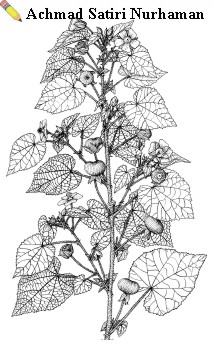Record Number
871
PROSEA Handbook Number
12(2): Medicinal and poisonous plants 2
Taxon
Abutilon hirtum (Lamk) Sweet
This article should be read together with the article on the genus: Abutilon in the Handbook volume indicated above in this database.
This article should be read together with the article on the genus: Abutilon in the Handbook volume indicated above in this database.
Protologue
Hort. Brit. 1: 53 (1826).
Synonyms
Abutilon graveolens (Roxb. ex Hornem.) Wight & Arn. ex Wight (1833).
Vernacular Names
Indonesia: kecemplok (Javanese), kembang sore besar (Balinese), bunga waktu kuning (Moluccas). Malaysia: angouri, bunga petang. Thailand: khrop chak krawaan (central), top taap (northern), khrop see (peninsular).
Distribution
Abutilon hirtum occurs in the drier tropical regions of the Old World, and is introduced into the Americas. In Malesia, it occurs locally throughout the area, except for Sumatra, the Moluccas and New Guinea.
Uses
In Malesia, Abutilon hirtum is used as a poultice to ease the pain of kidney gravel and often mixed with glutinous rice and applied to ulcers. In Thailand, the roots are used against cough and toothache, and as an antipyretic. The leaves or flowers are applied to abscesses.
Observations
An undershrub up to about 2.5 m tall; stems, petioles and pedicels densely covered with patent, long, shiny simple hairs, minute stellate hairs, and viscid by short glandular hairs; corolla orange-yellow, usually with a purple centre; seed completely or partly covered with short, patent, white hairs. In Malesia, Abutilon hirtum is found in waste places and along roadsides, especially in regions with a distinct dry season.
Image
 | Abutilon hirtum (Lamk) Sweet - flowering and fruiting branch |
Selected Sources
[786] Perry, L.M., 1980. Medicinal plants of East and Southeast Asia. Attributed properties and uses. MIT Press, Cambridge, Massachusetts, United States & London, United Kingdom. 620 pp.
Author(s)
Balu Perumal
Correct Citation of this Article
Perumal, B., 2001. Abutilon hirtum (Lamk) Sweet. In: van Valkenburg, J.L.C.H. and Bunyapraphatsara, N. (Editors): Plant Resources of South-East Asia No 12(2): Medicinal and poisonous plants 2. PROSEA Foundation, Bogor, Indonesia. Database record: prota4u.org/prosea

All texts are licensed under a Creative Commons Attribution-Noncommercial-Share Alike 3.0 Netherlands License
This license does not include the illustrations (Maps,drawings,pictures); these remain all under copyright.